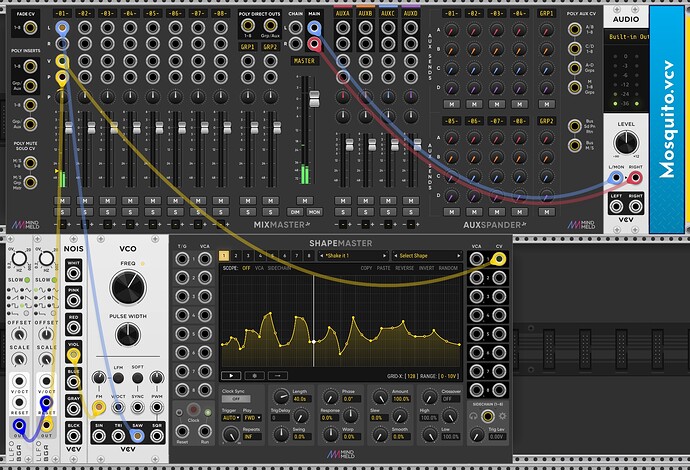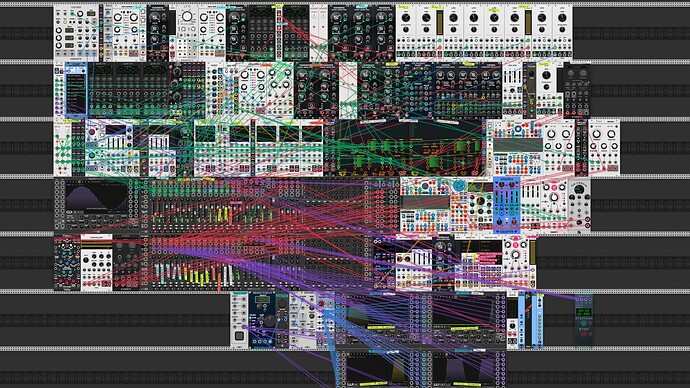These are some amazing generative nature sounds! Very nicely done.
Sounds from the last coral reef. A quiet, happy scene, waves crashing softly in a distance, dolphins and whales playing joyfully. But this place is also fragile and if not protected, could soon be lost forever.
Very cool. I enjoy seeing Pink Trombone used this way, which then feels a little disturbing once I read it back from my screen.
There is a definitely feeling of itchy bitey aliveness all around me!
That is a cool beach surf sound. It really has the feel of waves crashing and receding, a sound I have heard many times in the real world. And it combines well with the contemplative melody. Very nicely done!
This made me put King Crimson on.
Well done ![]()
Thank you! The spirit is maritime for sure.
For me, the challenge always is to find a good equilibrium in a patch between boredom and excitement, consistency and change, repetition and novelty, a harmonic and dissonant feel.
Does anyone have any strategic and practical tips on easing the quest for balance?
I do not want to hijack this thread, so created a new one. Perhaps there are some insights?
Thank you, King Crimson is always such an inspiration!
I wasn’t going to enter this because I haven’t got a full soundscape - but I do have a mosquito.
Mosquito.vcv (17.5 KB)
This is quite an annoying mosquito, well done!
Started with “wind through the trees”, then there wasn’t much room for much else. My attempt at a babbling stream is pretty cheesy.
Also features the rare “Karplus–Strong frog” and the slightly less rare “Burst generator bird”.
This doesn’t fit the challenge completely, because it is a huge patch (the largest I’ve ever done, and the most CPU consuming) and because I use some instances of VCV Host with Synplant (I wanted to try that feature that creates presets based on audio samples), but the patch I developed during the last week or so fits the theme of the challenge.
This patch is for a live performance and audio installation. The idea was to try to get close to nature and animal sounds with synths and to manipulate some field recordings and turn them into what could be synthesized sounds, or at least turn them into irrecognizable or musical textures.
I took some ideas for animal sounds from YouTube videos and an old post here in this forum.
For the live peformance I’ll be improvising on a keyboard over the soundscapes and I have a VCO and a sampler player connected to that, but for the installation version I’ll just have the different sounds coming in and out, with the volume being sequenced by some ShapeMasters.
Here’s an audio excerpt of some sections/soundscapes of the patch: https://whyp.it/tracks/196158/reflections-excerpts?token=Uqvhb
Eventually I’ll probably release some full recording of this online.
EDIT: Here it is Reflections | Bug Snapper
Oh man, I love the frogs and birds! Great work.
Whoah! You used an actual CHIRP module for the bird chirps! I didn’t see that coming.
.
.
.
.
![]() Yeah, I totally did see it coming.
Yeah, I totally did see it coming.
I especially like the “whales” (or White-handed Gibbons?) at 00:23 to 00:52.
For the gibbon-curious, I recorded this in 2013:
This is nice and compact. Wasn’t too familiar with how Zazel works, and your patch prompted me to take a closer look. Also never used Scanner before, which seems great for sweeps across the polyphony channels. Thanks, beautiful work!
Thinking on it … I nicked the bird technique from this video, I reckon:
This implementation is a very natural sounding result.
Glad you shared this. Very realistic, well done!
I missed out on the last few challenges - time to get back in the game.
I decided to go extremely minimal for this one - nothing but my Benjolin patch, plus some delay and reverb. It may be small, but it produces an entire world of sound. Other than tweaking the filter cutoff and resonance, the patch is fully auto-generative.
Don’t worry - the challenge boundaries are still in place, they are just outside the field of view. ![]()
It had been a while since I played with the Benjolin, but it didn’t take long to find something I liked.
I know a number of people are interested in the Benjolin, but feel they don’t understand how to use it. If you are looking for a particular sound, then you are likely to be disappointed. The joy I get is from freely experimenting and discovering totally unexpected sounds. The After Later Audio manual for their Benjolin v2 is an excellent resource for coming to grips with how it works, especially the sections starting with “GETTING MORE INTIMATE WITH YOU BENJOLIN”. It really isn’t needed, but once you understand better, it can give you more confidence to explore.
![]() Nice one!
Nice one!





